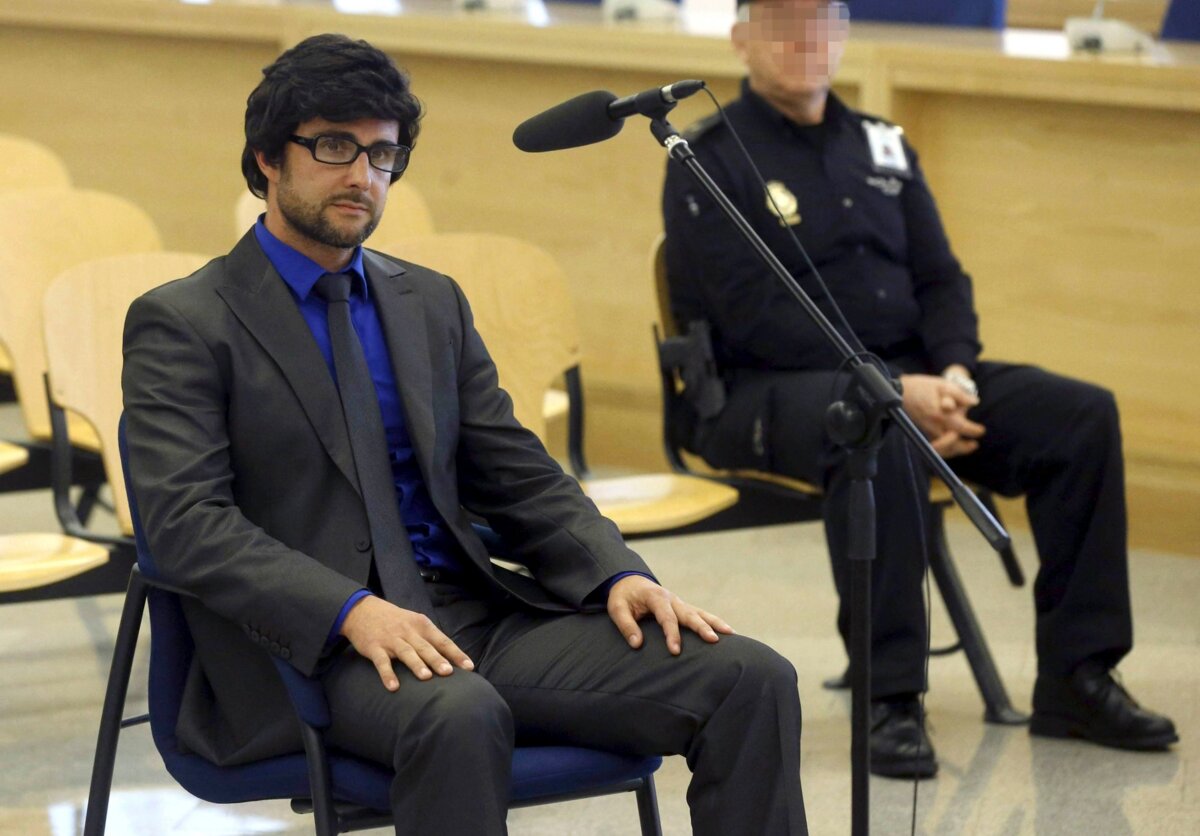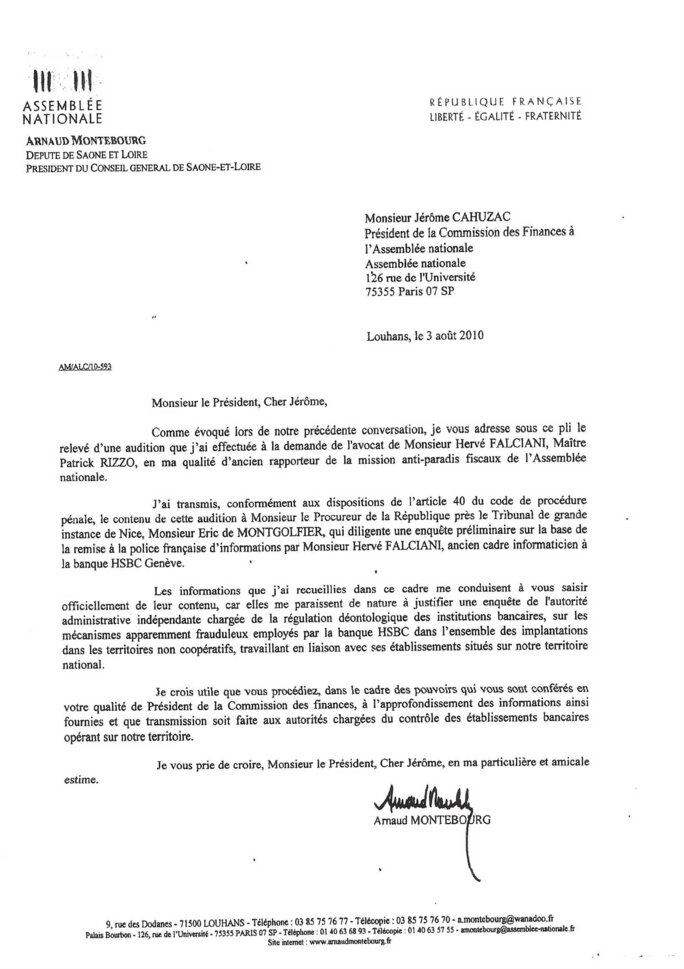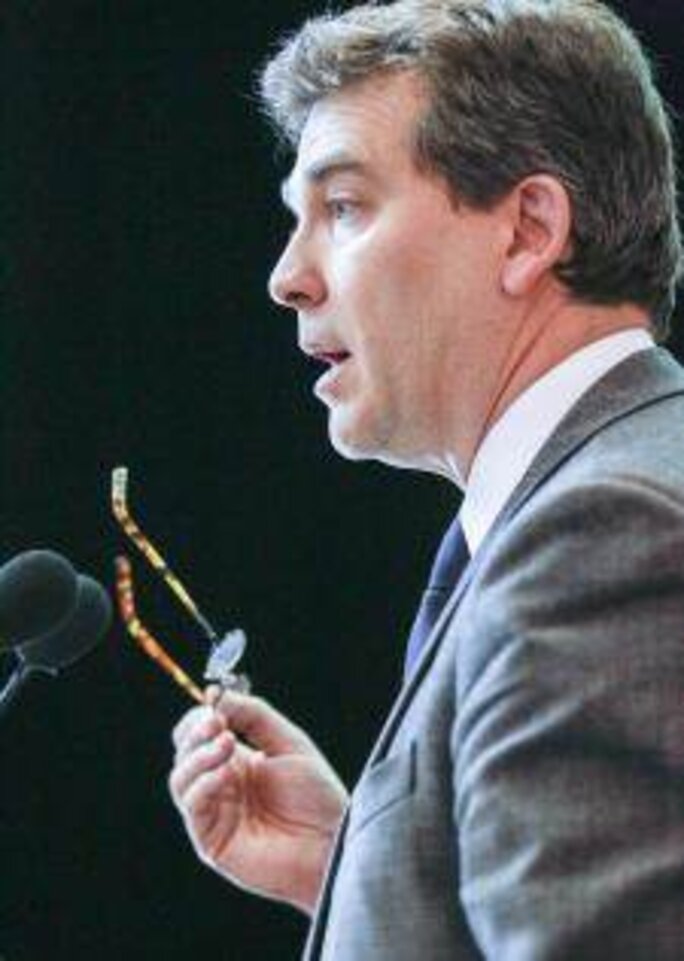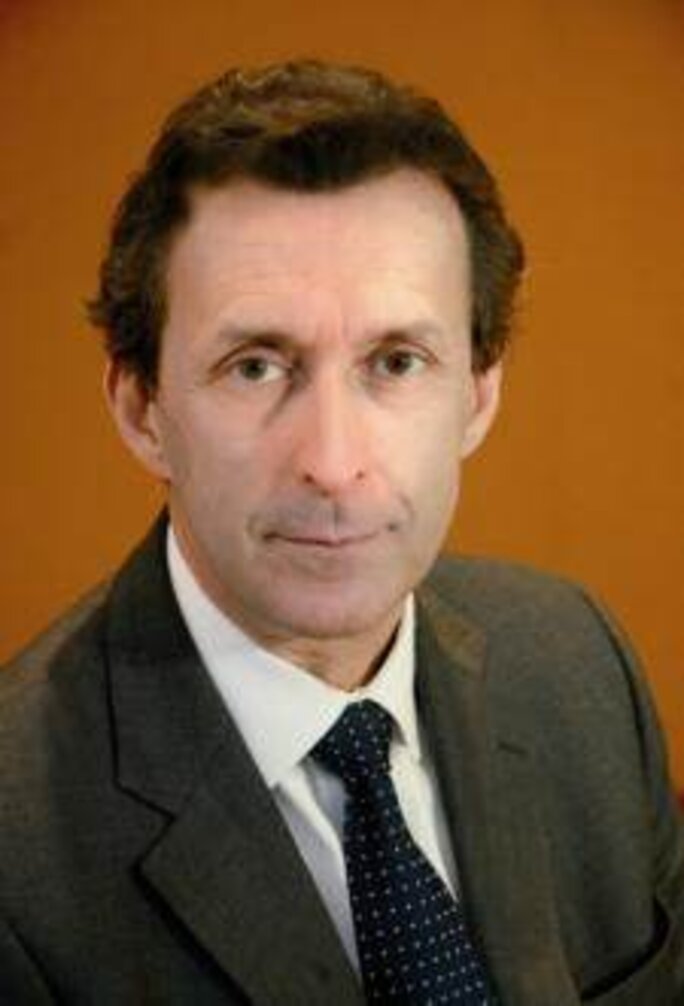Disgraced former French budget minister Jérôme Cahuzac, who in April confessed to holding a secret foreign bank account while leading a crackdown on tax dodgers, sat on evidence implicating the HSBC bank’s French unit in organizing tax evasion which was handed to him when he was president of the parliamentary finance commission, Mediapart can reveal.
The bank is now at the centre of a French judicial investigation into suspected “laundering of the proceeds of tax fraud” and the “illegal prospection” of clients. The investigation was launched in April, four years after a preliminary enquiry was opened by the public prosecutor's office under the previous conservative government.
Cahuzac, who as president of the parliamentary finance commission had the power to launch an independent investigation into the bank’s activities in France, received the information in August 2010, when his brother, Antoine Cahuzac, was a senior director with HSBC’s French arm.
At the time, Jérôme Cahuzac was an opposition Socialist Party Member of Parliament, who had been appointed to head the cross-party finance commission of the lower house, the National Assembly, in February 2010. Cahuzac was appointed budget minister in the socialist government that came to power in May 2012 after the election of François Hollande.
The evidence alerting him to HSBC’s suspected complicity in tax evasion was addressed to Cahuzac on August 3rd 2010 by fellow socialist MP Arnaud Montebourg, who is now industry minister. Montebourg had already raised the issue with Cahuzac’s immediate predecessor as president of the commission, Didier Migaud, to no avail. Migaud retired from the commission in February 2010 to preside the national audit court, the Cour des Comptes.

Enlargement : Illustration 1

The information sent to Cahuzac by Montebourg contained the transcript of a private interview he had conducted with Hervé Falciani, a former HSBC computer systems engineer who worked for the bank’s Swiss operations.
Falciani fled to France from Switzerland in 2008 with confidential data revealing the existence of thousands of secret accounts held with the bank’s Swiss division, and which were subsequently passed on to the tax authorities in several countries, including France. The data subsequently served as the basis of several wide-ranging investigations in the US, Italy, Spain and Belgium.
HSBC claimed Falciani had leaked the details of 24,000 of its wealthy clients. However, acting upon a request from the Swiss authorities, in January 2009 French police searched Falciani’s then home in southern France, and found data concerning 127,000 HSBC accounts.
Last month, Falciani, 41, who now lives in Spain, successfully fought off an extradition demand by Switzerland, where he is wanted on charges of theft and breach of banking secrecy rules. A Madrid court recognised that Falciani had allowed “the revelation of criminal situations dissimulated or allowed by the financial institution”, and has now been granted official protection by the Spanish authorities.

Enlargement : Illustration 2

But in early 2010, a French investigation into the suspected tax evasion among some several thousands of accounts belonging to French nationals exposed by Falciani appeared stalled, prompting Montebourg’s initiative to contact Cahuzac. Montebourg is a close acquaintance of Falciani’s French lawyer, Patrick Rizzo, who had expressed his fears that the preliminary investigation into Falciani’s potentially explosive information, which reportedly implicated ranking public figures among the wealthy tax-dodging clients of HSBC, would be shelved.
'I could lead a horse to water but not make it drink'

The preliminary investigation was led by Nice-based public prosecutor Eric de Montgolfier. “I went to see Eric de Montgolfier who at the time told me ‘I am going to be removed [from the case], they are not happy to see me poking my nose into this affair’”, Montebourg recalled. “I understood, and in fact that was the situation.” In January 2011, on the orders of the then conservative justice minister Michèle Alliot-Marie, the case was handed over to Paris public prosecutor Jean-Claude Marin.
On March 2nd 2010, Montebourg conducted a recorded interview with Falciani in which the latter detailed the bank’s alleged illegal practices and the implication of a number of so-called ‘Politically-Exposed Persons’. Falciani spoke of “various” internal reports that revealed HSBC’s failure to comply with international regulations. “They show how the legal structures allowed for the distancing of the [identity of the] true owner of the accounts there where they were recorded.”
The 25-page transcript, authenticated and signed by Falciani, was sent to Cahuzac with a covering letter by Montebourg that read: “The information I have collected prompts me to officially notify you of the contents, for they appear to me to be of a nature that justifies an enquiry by the independent administrative authority in charge of the deontological regulation of banking institutions into the apparently fraudulent systems used by the HSBC bank in all of its [units] in non-cooperative territories [tax havens] that work together with its establishments situated on our national territory.”
Cahuzac had the power to launch a parliamentary enquiry into Falciani’s allegations, or to demand an investigation by France’s banking watchdog, but he did neither. Indeed, Montebourg never even received a reply. “Jérôme Cahuzac has always dodged these questions,” Montebourg recalled. “I could lead a horse to water but could not make it drink.”
The current president of the French parliamentary finance commission, conservative UMP party MP Gilles Carrez, was the commission’s rapporteur when Cahuzac was president. He said that Cahuzac had never mentioned the transcript of Montebourg’s interview with Falciani.

However, Carrez said he had himself already disapproved of Montebourg’s initial approach to the commission, before Cahuzac succeeded Didier Migaud as president. “Together with Didier Migaud, we felt that we had done our job in a constructive way and with the necessary diligence, that the data was in the hands of the justice authorities and the tax administration, “ Carrez said. “If my memory is correct, Hervé Falciani was questioned on several occasions by Eric de Montgolfier and we reckoned that there was no call for parallel action that would risk causing the case confusion. We didn’t want one person or another to take the fore of the stage by taking hold of a case that was already mediatised.”
But exactly why Cahuzac, who it is now established held a secret account opened in Switzerland with the UBS bank, failed to react to Montebourg’s initiative remains unknown. What is clear is that his brother Antoine was at the time a long-serving senior management figure with HSBC’s French arm, where in 2010 he served as an executive director of HSBC Private Bank France.
A graduate of the Ecole Polytechnique, in 1985 he joined the French bank CCF, which was later taken over by HSBC. He went on to serve as senior corporate adviser to the CEO of HSBC France and later became the head of Institutional and Corporate Clients. In 2011 he was appointed chairman of HSBC Private Bank France. He finally left the bank in January 2012 to take up the post of CEO of EDF Energies Nouvelles, the renewable energies branch of the French utility giant EDF.
Neither Jérôme Cahuzac, Antoine Cahuzac nor Didier Migaud answered Mediapart's requests for an interview on the issues raised in this article.
In 2009, public prosecutor Montgolfier gave the French finance ministry the list of the French accounts with HSBC in Switzerland that figured on Falciani’s HSBC data files. The then-budget minister, Eric Woerth, launched what he called ‘Operation Chocolate’, which consisted of a public invitation to French residents holding secret accounts with HSBC to return their undeclared assets to France.
Woerth announced 3,000 French tax fraudsters had been identified from Falciani’s files (which the French finance ministry has now recently revealed contains 6,313 accounts held by French individuals and private entities). Just 66 account holders volunteered to settle their tax situation.
Until now, a total of 896 account holders have been the subject of investigation by the tax authorities, of which 86 have been subject to prosecution.
Meanwhile, according to a report published yesterday, June 9th, in French daily Le Parisien, Cahuzac used his powers as president of the parliamentary finance commission to consult, in 2010, the list of HSBC accounts held at the French finance ministry, as well as other case files concerning suspected tax evasion. “We were cautious, and some were angry, but we couldn’t refuse him anything,” the daily quotes one unnamed former advisor to the budget ministry as saying.
While Cahuzac’s reasons for demanding access to the tax investigations are unclear, Le Parisien suggested that the knowledge he gained from the confidential files might explain the relatively clement reaction among many in the political establishment to the disclosure of his own tax evasion, which was first revealed by Mediapart last December.
-------------------------
- The interviews and documents contained in this report were obtained as part of a joint investigation with French TV current affairs programme 'Cash Investigation', to be broadcast on the France 2 channel on Tuesday June 11th at 8.45 p.m.
-------------------------
English version by Graham Tearse


